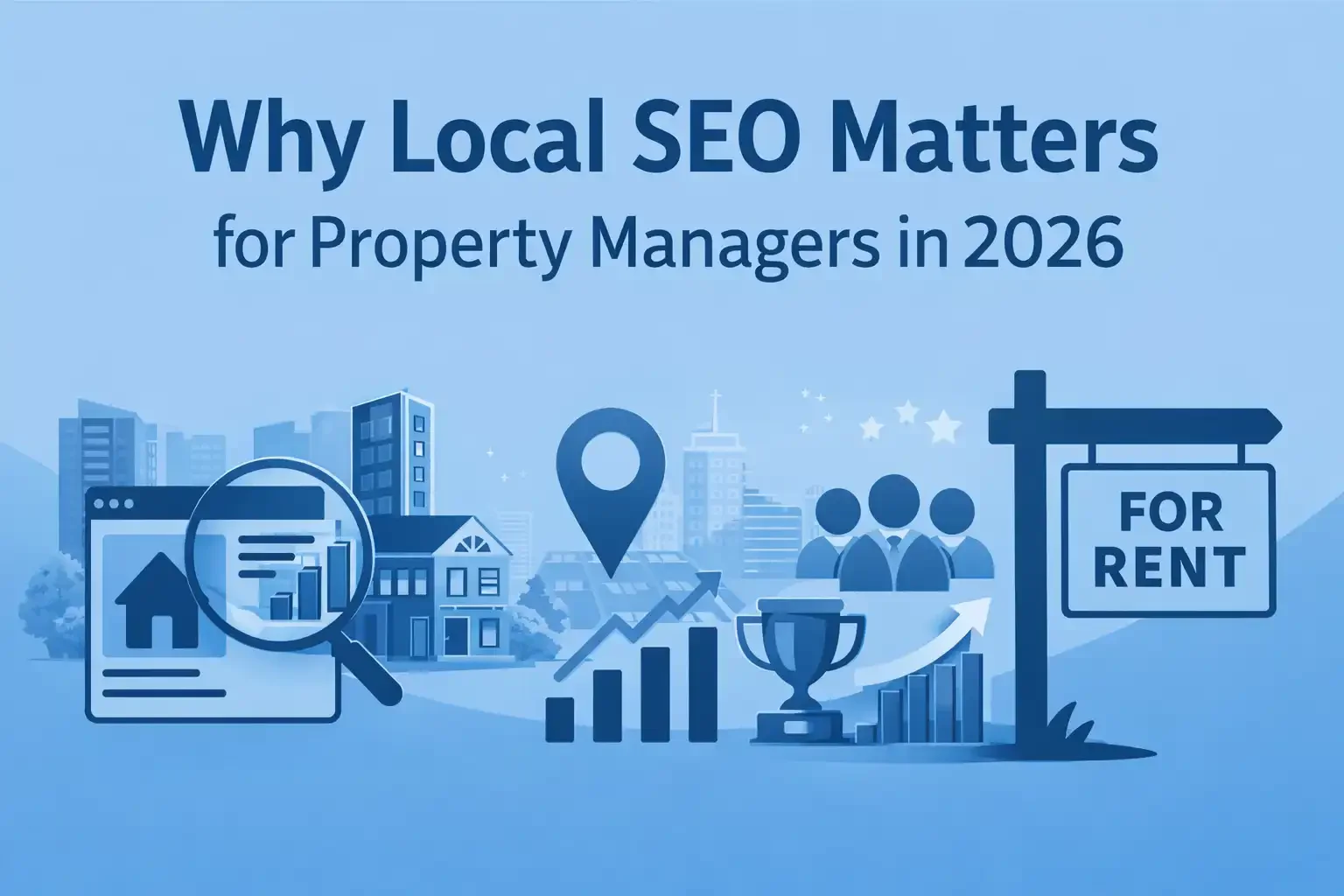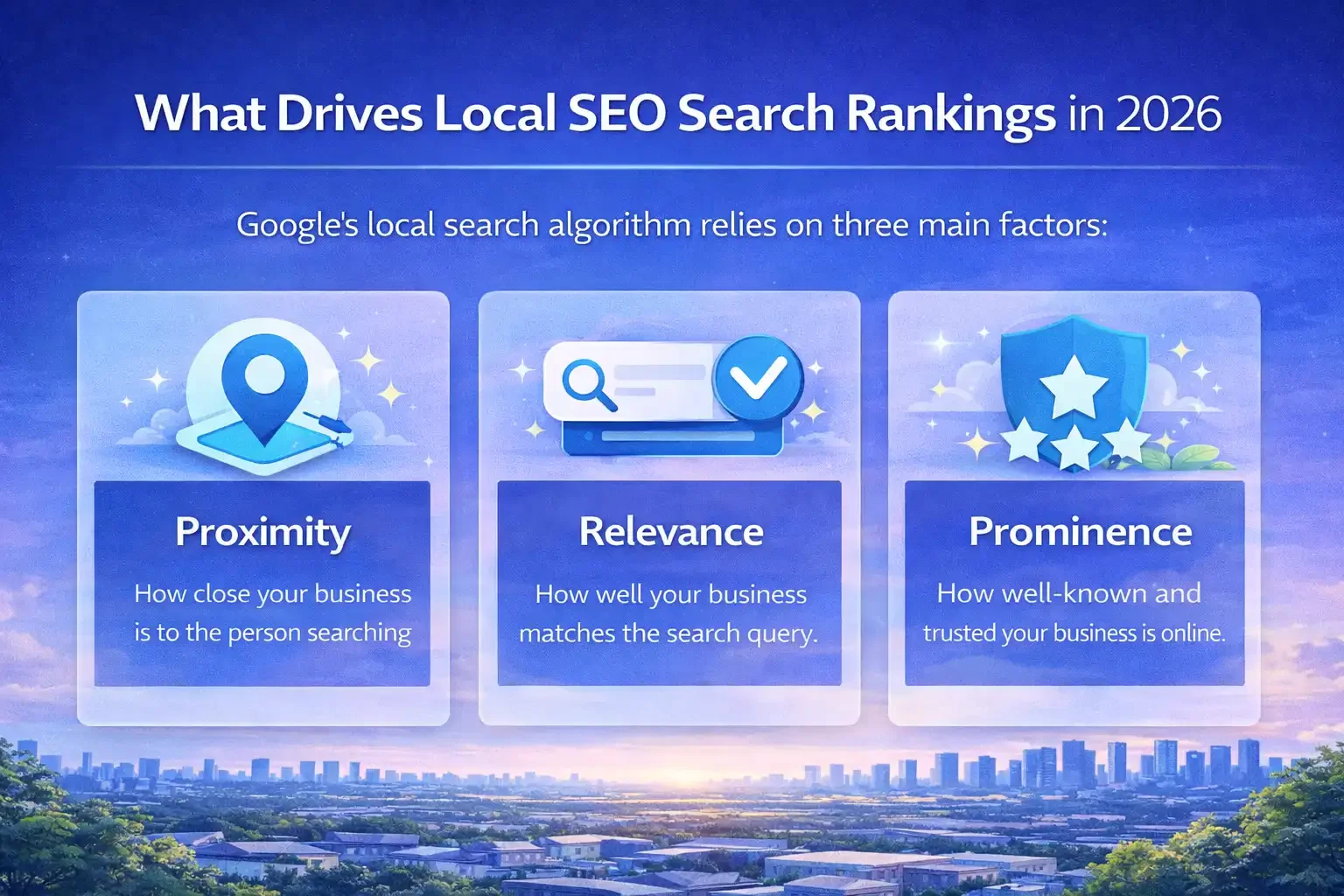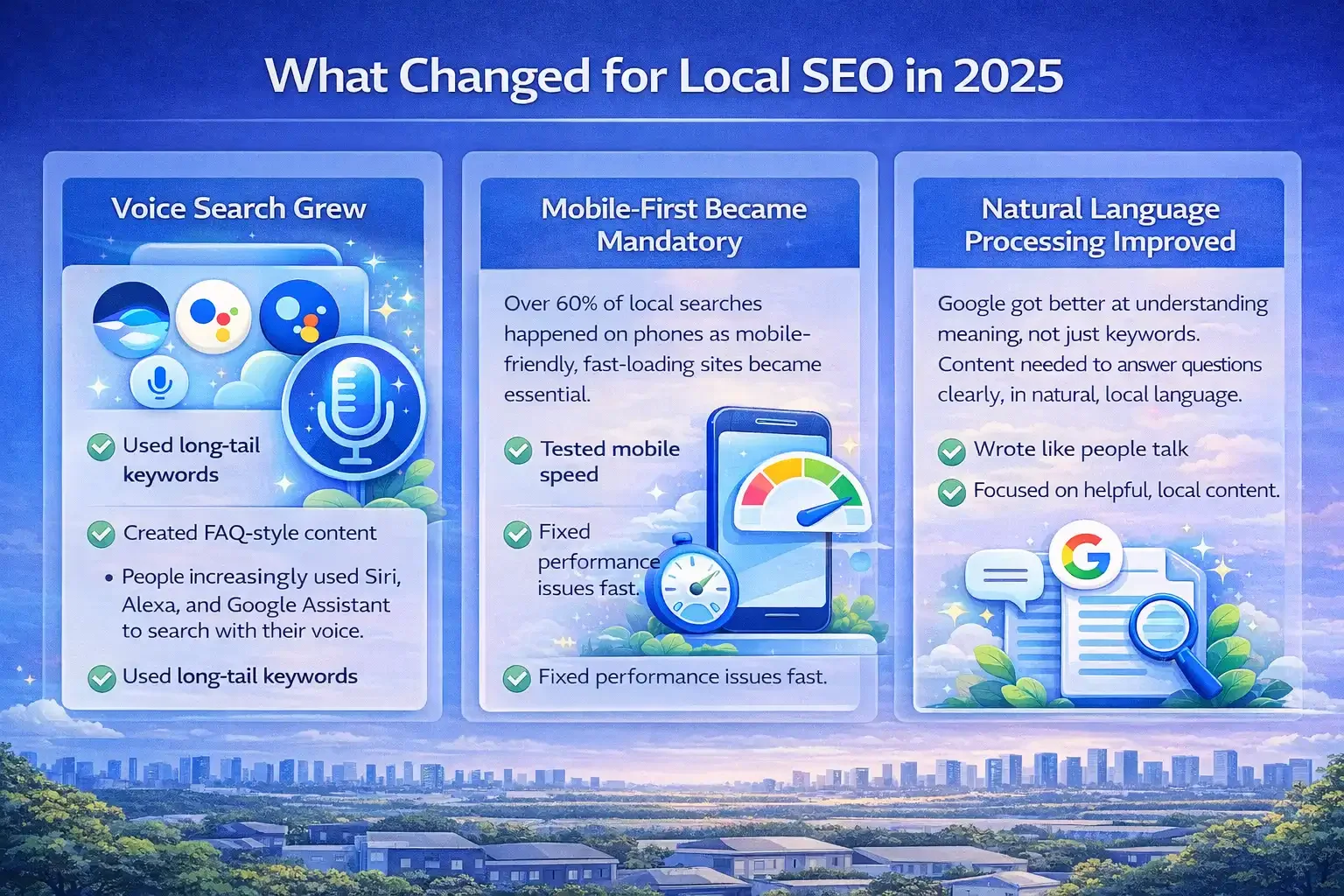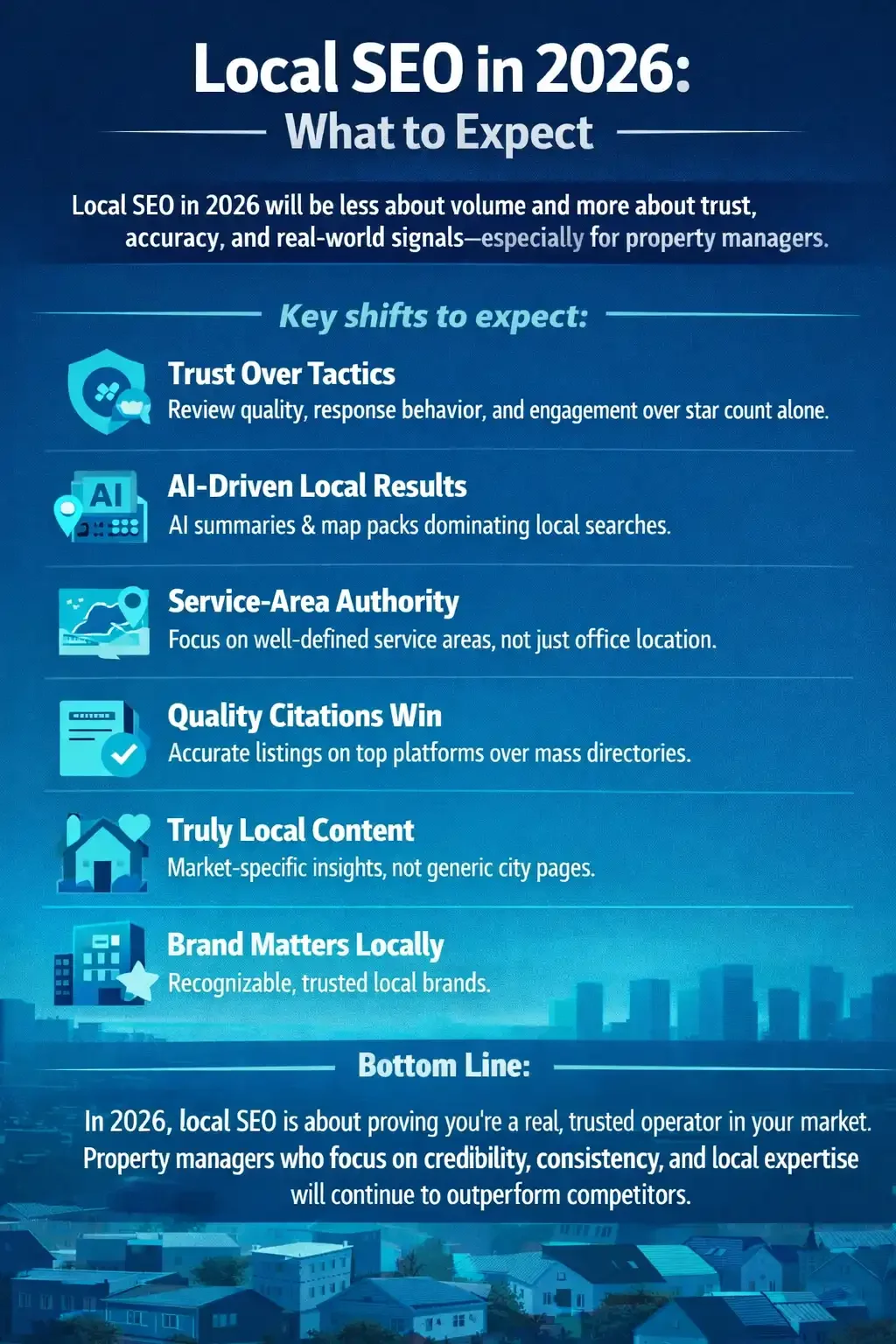Why Local SEO Matters for Property Managers in 2026
Last Updated: December 26, 2025
Local SEO is no longer optional for property managers in 2026—it’s the key to showing up where it matters most: in front of your local clients. Learn how to boost visibility, drive leads, and build trust in your community with proven local SEO strategies tailored for property management.
Local SEO isn’t just helpful for property management companies—it’s essential. In 2026, with digital search behavior evolving fast, having a strong local presence online can make or break your ability to attract clients in your area.
People are searching for property managers near them, and if your business isn’t showing up, you’re invisible to the very clients you’re trying to reach. Local SEO helps you stand out where it matters most—right in your community.
Table of Contents
What is Local SEO — and Why It Matters?
Local SEO is all about optimizing your business to show up in local search results. That means when someone types in “property manager near me” or searches for services in your area, your company shows up front and center.
For property managers, local SEO isn’t optional. It drives traffic, builds trust, and positions your business as the go-to in your neighborhood.
Key pieces of local SEO include:
Your Google Business Profile (formerly Google My Business)
Local citations (like directory listings)
Customer reviews
Consistent NAP (name, address, phone number) across platforms
When done right, local SEO helps you get seen by the right people—those looking for your services right now.
Local SEO vs. National SEO: What’s the Difference
While national SEO targets a broad audience, local SEO focuses on a specific region. That distinction is crucial.
For property managers, local SEO is the clear winner. You’re not trying to reach people in every state—you want property owners and tenants in your area. That’s what local SEO is built for.
Main differences:
Local SEO targets nearby clients and prioritizes geographic relevance.
National SEO focuses on broader brand visibility, often for companies with multiple locations or a national presence.
What Drives Local SEO Search Rankings in 2026
Google’s local search algorithm relies on three main factors:
Proximity – How close your business is to the person searching.
Relevance – How well your business matches the search query.
Prominence – How well-known and trusted your business is online.
For property managers, this means you need to:
Be physically close to your target clients.
Use the right keywords to match their searches.
Build a strong reputation with reviews and online presence.
Online Reputation Management: Why Reviews Matter
Reviews are one of the biggest drivers of trust and visibility. Google factors them heavily into local rankings, and prospects rely on them to choose between you and your competitors.
Here’s how to stay on top of your reputation:
Ask happy clients to leave reviews.
Respond to reviews quickly and professionally—especially negative ones.
Stay transparent and consistent in your messaging.
The Power of Local Citations
Citations are online mentions of your business on directories like Yelp, Nextdoor, or industry-specific platforms. They help validate your legitimacy to both users and search engines.
To get the most out of citations:
List your business on high-quality, relevant directories.
Keep your NAP info identical across all platforms.
Review and update listings regularly.
Optimizing Your Google Business Profile
Your Google Business Profile is your digital storefront. It often shows up before your website in local results.
To optimize it:
Keep hours, contact info, and services up to date.
Add photos of properties, your team, or office.
Respond to questions and reviews from users.
An optimized profile not only improves your local rankings but also increases engagement from people browsing your listing.
Using Local Search Optimization to Stand Out
To attract more local traffic, tailor your content and SEO strategy to your market.
What to focus on:
Add location-specific keywords to your site (like “Jacksonville property management”).
Highlight services that make sense in your area (e.g., HOA management in suburban neighborhoods).
Create content that answers local questions, like market updates or neighborhood guides.
This approach signals to Google—and users—that you’re a local expert.
Why Local Keywords Matter
Local keywords help connect your business with people looking for your services nearby. Without them, your website might not show up when it should.
To get it right:
Use tools like Google Keyword Planner or local SEO platforms to find relevant search terms.
Include your city, neighborhood, or zip code in headlines and meta descriptions.
Update your keyword list often to reflect new trends or search behavior shifts.
Creating Location-Based Content
Generic content won’t cut it. To rank locally, your content needs to reflect what’s happening in your area.
Ideas include:
Writing about local real estate trends
Covering property tax updates or rent control legislation
Sharing highlights from community events you sponsor or attend
This type of content not only boosts SEO but also builds a stronger connection with your audience.
Building a Strong Online Presence
Your website is still your digital home base. It needs to:
Load quickly
Work well on mobile
Be easy to navigate
Beyond that, you should be active on social media, respond to messages, and keep content fresh. A strong online presence shows clients you’re engaged, modern, and trustworthy.
Social Media and Local Engagement
Social media helps property managers stay connected with the community. It’s not just about promotions—it’s about being visible and helpful.
Post about:
Available properties
Maintenance tips
Local news or events
Encourage comments and shares to boost reach and build local trust.
Managing Reviews (Even the Bad Ones)
Don’t ignore reviews. Whether good or bad, they influence how people see your business.
Best practices:
Thank clients for positive feedback.
Respond calmly and professionally to complaints.
Learn from reviews to improve your services.
Consistent review management shows potential clients that you care about their experience.
What Changed for Local SEO in 2025
Staying competitive means staying ahead of trends. Here’s what’s shaping local SEO this year:
1. Voice Search Is Growing
People are using Siri, Alexa, and Google Assistant to search with their voice. That means your content needs to sound natural—like how someone would ask a question out loud.
Tip: Use long-tail keywords and FAQ-style content to target voice searches.
2. Mobile-First Is Mandatory
More than 60% of local searches happen on phones. Your website needs to look great and work flawlessly on mobile. Speed matters, too—slow sites lose traffic.
Tip: Test your mobile speed and fix performance issues fast.
3. Natural Language Processing (NLP)
Google’s getting better at understanding meaning, not just keywords. Your content should answer questions clearly, using everyday language.
Tip: Write like you talk. Focus on helpful, local content.
Local SEO in 2026: What to Expect
Local SEO in 2026 will be less about volume and more about trust, accuracy, and real-world signals—especially for property managers.
Key shifts to expect:
Trust over tactics: Review quality, response behavior, and ongoing engagement will matter more than star count alone.
AI-driven local results: More searches will end in map packs and AI summaries, making your Google Business Profile as important as your website.
Service-area authority: Rankings will rely less on office location and more on clearly defined, well-supported service areas.
Quality citations win: Fewer, accurate, well-maintained listings will outperform mass directory submissions—platforms like ClearLead Local will matter more.
Truly local content: Generic city pages will fade; market-specific insights and community relevance will win.
Brand matters locally: Google will favor recognizable, trusted local brands—not just optimized listings.
Bottom line:
In 2026, local SEO is about proving you’re a real, trusted operator in your market. Property managers who focus on credibility, consistency, and local expertise will continue to outperform competitors.
Final Thoughts
Local SEO isn’t just a marketing tactic—it’s a competitive advantage. Property management companies that invest in it will attract more clients, build stronger reputations, and stay visible where it counts most.
Whether you’re optimizing your Google Business Profile, targeting the right local keywords, or keeping up with trends like voice search, the key is to start now and keep refining your strategy.
Use top local citation management services like ClearLead Local to boost on local visibility.
In 2026 and beyond, local visibility equals local success.
Frequently Asked Questions (FAQs)
-
Local SEO helps property management companies show up in search results when people nearby look for services like rental management, leasing, or maintenance. It focuses on optimizing your online presence for local searches using tools like Google Business Profile, local keywords, and online reviews.
-
In 2026, more people use mobile devices and voice assistants to find local services. Local SEO helps you appear in those search results, bringing in more leads and building trust in your community.
-
You can improve local rankings by:
Optimizing your Google Business Profile
Getting consistent NAP citations across directories
Earning positive customer reviews
Using local keywords in your website content
Creating content relevant to your service area
-
Local SEO targets clients in your immediate area, while national SEO is aimed at broader audiences across multiple regions or states. For most property management firms, local SEO drives more qualified leads.
-
Google looks at three main factors:
Proximity – how close you are to the searcher
Relevance – how well your content matches what they’re looking for
Prominence – your online reputation and visibility
-
Yes. While social media doesn’t directly affect rankings, it increases visibility, boosts engagement, and encourages more people to visit your site or leave reviews—factors that support your overall local SEO strategy.
-
Very. Reviews influence both your reputation and your local search rankings. The more positive, detailed reviews you get (and respond to), the more likely you are to show up in Google’s local pack and maps results.




